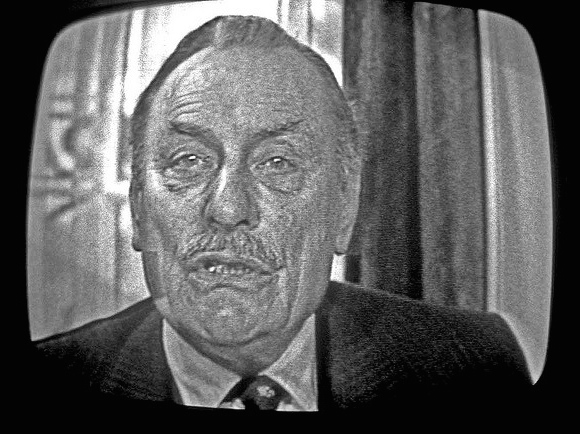The lady in Clacton-on-Sea’s library says she’ll be glad to tell me who she is voting for in the by-election taking place today. “I’m white, I’m English….he’ll help us get out of Europe. Obviously I’m going to vote for Carswell! Who do you vote for?”
Probably in her late sixties, the lady has a northern accent, but declines to give her name or age. Her granddaughter tells her to tone it down. Being white and English-born of British parents myself, by her logic I should be voting for Douglas Carswell. Carswell is the latest defector from David Cameron’s Conservatives to the anti-EU party, UKIP. I say I don’t live in the area. Not listening, she spits out, “He’ll vote Labour! They all do! Journalists, teachers, social workers…”
Before going to bed last night, I watched Downfall, the story of Hitler’s last days. I’m sure it gave me the nightmare that caused me to awake at 3am. And if I hadn’t watched it, I probably wouldn’t expect this pensioner to go on to say that we are all traitors who deserve to be rounded up and shot, but in any case, her granddaughter quietens her down and herds her away.
Across the road from the library is the UKIP campaign office, and I see the party leader, Nigel Farage, disappear into the backrooms. I try to follow him, but I am stopped by a young man who bears more than a passing resemblance to a uniformed and booted young zealot I was watching last night. He’s the UKIP press officer, and he gives me an order to wait outside.
Douglas Carswell finally appears outside the UKIP campaign office and proclaims, “I wouldn’t be here today if I thought the Conservative Party were serious about delivering on the 2010 manifesto. I still believe in the 2010 manifesto and its promises to redistribute power from the state to government [and have locally elected councils instead of Whitehall decide on planning issues].
Like its headline policies on Europe and immigration, this is another policy championed by the late Enoch Powell, former Conservative MP who resigned from his party and told the electorate to vote Labour in 1974 because at the time it was the more Eurosceptic party.
At home or not, the Westminster-born 43 year old is well spoken of by many as one who works hard for his constituents.
Pam Bailey, 63, a volunteer worker in the Salvation Army charity shop says, “I voted for Carswell because he’s got a lot of integrity. I know a lot of people who’ve been helped by him.”

However, Carswell is taken to task by a man outside the Town Hall who wants to know what UKIP will do to help to help the unemployed and homeless after the government closed the drop-in centres. He receives a guarantee that he will personally take him to the Job Centre and give him whatever help he needs to find work. The man tells me he had been considering voting for Carswell, but having heard about their laissez-faire approach to welfare, he will now vote Labour.
Some critics of the party have said that the vast majority of UKIP supporters are retired and white, and more popular with men than women. Clacton has twice as many retired residents as the national average, while 57% of constituents are aged over 45. It is true that the majority of UKIP supporters are in this age group, but Tony Georgiou, 51, proprietor of Geo’s Fish Bar and Restaurant insists he will remain loyal to the Conservatives. “I was born in Clacton, I’ve always lived here. Immigration is not an issue and we need to stay in the EU. We’ll do better staying in.”
Jo Garraty, 20, however, disagrees. “I do intend to vote [for UKIP]. I’m not racist in the slightest, but there are people who come here and take, take, take and then just sod off home again.”
She didn’t, however, know that the current MP had defected to UKIP. She is unique among her group of friends as none of the three with her intends to vote.
Carswell will add UKIP extra credibility as well as a presence in Parliament and it will be more difficult to make the charge that the party is a one-man band. But it is undeniable that much of UKIP’s success has been down to Nigel Farage’s bonhomie and his ability to project himself as someone from outside the establishment, despite the fact his parents were wealthy enough to send him to public school and he did very well himself working as a broker in the City of London. He was also an active Conservative party member since his school days. He deserted them in 1994 after John Major’s government signed the EU Maastricht Treaty.
David Osler wrote last year in Left Futures that Nigel Farage is a low-rent Enoch Powell. Powell is best (or worst) remembered for his opposition to immigration and membership of the Common Market, or the EEC, (as it was then), but these are only the two headline-grabbing policies for which UKIP and Powell were recognised for. It is remarkable how many of his policies manifest themselves on the UKIP platform.
Margaret Thatcher was an admirer of Powell, especially the economic policies he espoused, although he criticised her for not applying them correctly. He also railed against the erosion of local government power during the Thatcher years. Powell was a critic of Britain’s slavish subservience to US interventionism in foreign wars. He strongly opposed the UK holding an independent nuclear deterrent. None of which are policies inconsistent with the libertarians of UKIP.
It would seem to be political suicide for someone like Douglas Carswell to imitate the former member for Wolverhampton South-West and South Down, but with Powell as its unofficial patron saint, it could be seen as a perfectly logical trajectory to follow. Powell forsook the opportunity of high political office over the issue of British sovereignty, and Carswell has followed in his footsteps.
Upon casting his vote, Carswell exits the Town Hall and proclaims, “I feel I’ve finally come home.” If there are lost spirits roaming the Earth looking for a resting place, the ghost of Enoch Powell must be speaking exactly the same words.
Photographs courtesy of Alan Denney and David Watson. Published under a Creative Commons license.





